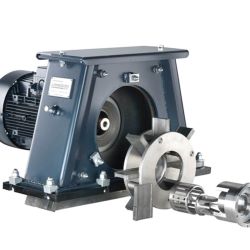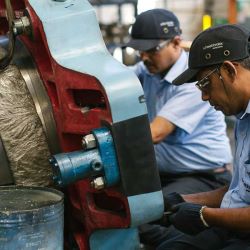High speed production with scrap below 1%
In 2011, MAT Dalian purchased and installed a two-line DISA Complete Foundry solution, comprising DISAMATIC 230-X vertical moulding lines, DISACOOL cooling drums and Wheelabrator CT3 shot blast machines. One line is used to produce grey iron brake discs and the other is for ductile iron components, with a combined annual production capacity of about 60,000 tons.
“These lines have been running well for more than a decade,” says Mr Liu. “They are very well suited to producing auto parts and we are very satisfied with their performance and high uptime. The average scrap rate of our brake discs is below 1%.”
All castings pass through Wheelabrator Continuous Through-Feed Tumblast (CT) machines for desanding and cleaning. The CT’s design ensures all parts of a casting are evenly blasted while cooling both castings and sand.
Offering high capacity and throughput speeds, its barrel rotation speed and abrasive throughput are electronically controlled so it can adapt automatically to any fluctuation in line speeds to maintain a continuous production flow. MAT Dalian produces many different types of brake discs, both solid and ventilated. These must be processed separately and the CT copes easily with the demands of these shorter runs.
“The CT is exactly the right machine for cleaning brake discs,” says Mr Liu. “Brake discs are relatively flat structures and the CT ensures the inner surface is completely clean. Its reliable and predictable high quality is vital as we supply many top automotive plants. The CT process is also very stable, fast and efficient and it can easily keep up with the high volume production of our DISAMATIC moulding lines.”
A consistently superb surface finish
“The surface finish of our castings is very smooth with almost no bumps,” explains Mr Liu. “That reliable high quality is one of the big advantages of the CT, and it’s the main reason we chose it. Bumps are very, very few, almost zero, and this cuts our costs significantly.”
There are other benefits from this fast, economical surface finishing method. Shot blasting with the CT machines ensures that all MAT Dalian’s foundry returns are very clean and can be re-melted as scrap without any issues.
“Some argue that you shouldn’t blast scrap like the gating system that will just be remelted, but that is a false economy,” says Mr Liu. “Remelting a clean gating system means the electric furnace will consume less energy and only produce a small amount of slag. The operators will use less slag remover and need less force to remove slag. On the other hand, if you produce a lot of slag then more will remain in the liquid iron and end up in the castings, which will increase your scrap rate.”
Reliability is also excellent: the overall uptime rate of the machines is around 99%, aided by MAT Dalian using only original spare parts for servicing. The support from Norican’s global network is equally dependable. As well as a 24/7 DISA hotline, there’s also an annual service agreement with DISA that guarantees a response within 24 hours. Both DISA and Wheelabrator’s engineers will arrive rapidly on site if necessary.
“We have our own professional maintenance team with experienced electrical, mechanical and hydraulic engineers and technicians,” says Mr Liu. “We have built up our own experience, with DISA´s and Wheelabrator's aftermarket teams giving us a lot of guidance and technical instruction. That’s helped us to fully understand the operating principles and internal structure of this equipment, which has helped us optimise our daily basic maintenance routines too.”
Fast, efficient and clean, with the lowest operating costs
An entire line can be run by two or three operators, far fewer than lines from other suppliers in China that can require 10 or more personnel. With high availability and minimal labour costs, overall operating costs have been consistently low.
MAT Dalian’s factory was expertly planned from the start to offer a clean, safe and pleasant working environment. The entire production line is equipped with dust extractors that feed 11 large outdoor dust collectors. These capture any dust produced, from sand mixing to quality control. Dust cloth bags are changed annually to ensure maximum suction.
“The Wheelabrator CT3 gives you a very efficient and economic shot blasting method to produce car calipers, brackets, and brake discs,” says Mr Liu. “We will stick with this CT blast machine and, if a new factory is built in the future, I will support using DISA and CT machines there too.”


